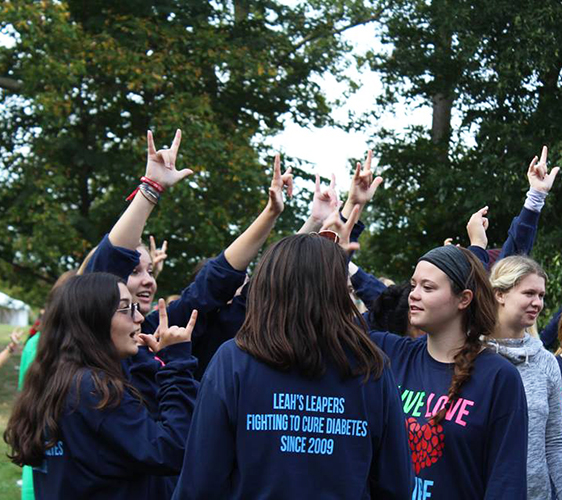Life’s setbacks turn to blessings

WORTH THE WALK: Celebrating as a team, Dunne’s Juvenile Diabetes Research Foundation walk team raised $3000 on Oct. 1. Dunne has been participating in the walks for eight years and has raised over $30,000 in total for juvenile diabetes research. Photo courtesy of Leah Dunne
November 10, 2017
As soon as Nov. 1 hit, (seniors you’ll understand me) all I could do was take a huge deep breath and release the anxiety that had been building since summer. Let’s face it: college apps were no walk in the park. Having to dig deep down and write about obstacles you’ve encountered and how you’ve grown from them in under 650 words was truly a struggle for me, and I’m sure it was for you too.
Over the past couple of months—and in writing these essays—I’ve come to realize that one of the greatest challenges I have faced is my diagnosis with Type I Diabetes (T1D), and it has actually been one of my greatest blessings in my life. Anyone could use these essays as an opportunity to gain perspective from difficulties in your own life.
If you asked nine-year-old pre-diabetes me what I thought I would be doing at school, giving a presentation to my fourth grade class about how my body no longer creates insulin producing cells was not at all on my radar.
After I finished the presentation, a girl asked “How do we make sure that we don’t catch it from you?” I tried to explain to her that it was not contagious, but somehow I knew that regardless of what I said my classmates were still scared of it.
And I’ve heard it all from “Should you really be eating that?” to “More exercise will help cure it.” Now as I’ve gotten older, I recognize that there are many misunderstandings about T1D, and because of this I have made it a priority to advocate for my condition. I fundraise for diabetes walks with Juvenile Diabetes Research Foundation and work with Congress to lobby for legislation and funding for people with medical conditions.
In part with facing these misunderstandings, I made the decision (or rather was forced) into going to diabetes sleep-away camp. At the time it sounded like the worst possible place: being forced to talk about diabetes all week when at that point all I wanted to do was forget I even had it.
Today if you ask me where I’ll be the first week of August every year, without a doubt, my answer will always be camp. From Houston, to Oswego and even right here at South, the friendships that I have with other diabetics are some of the most important in my life.
Camp has allowed me to feel some sense of normalcy, something that was so needed when I was first diagnosed. Meeting other diabetics made me feel so much less alone and assured me that I was not the only person in the world that had to go to the nurse every day before lunch to take an injection of insulin.
Although camp and the friends that I have made make me feel so much more open to sharing my story with others, I did not always feel so comfortable sharing with students why I’m always drinking juice boxes or why I have injection scars on my stomach. Everyone has their obstacles they are dealing with, and although diabetes is mine, it has allowed me to empathize and relate to my peers on a much deeper level.
Diabetes is not something I should be ashamed of or feel the need to hide from others: a lesson that I internalized and even tried to avoid for a long time. And while the ways that diabetes has impacted me are countless, by far the most important has been in allowing me to see a significant setback as anything but that. It propels me forward with newfound friends and a sense of purpose.
Until we start to look at our obstacles as anything but a negative force in our lives, that’s all they will ever be. Once we start to look at how our setbacks have changed us for the better they will slowly turn into blessings.


